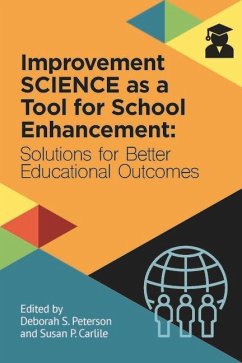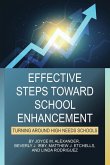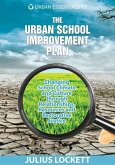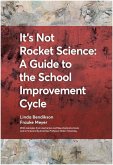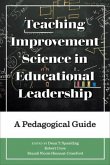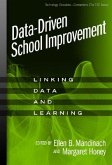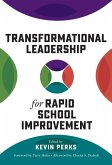Improvement Science as a Tool for School Enhancement
Solutions for Better Educational Outcomes
Herausgeber: Peterson, Deborah S; Carlile, Susan P
Improvement Science as a Tool for School Enhancement
Solutions for Better Educational Outcomes
Herausgeber: Peterson, Deborah S; Carlile, Susan P
- Broschiertes Buch
- Merkliste
- Auf die Merkliste
- Bewerten Bewerten
- Teilen
- Produkt teilen
- Produkterinnerung
- Produkterinnerung
Improvement Science as a Tool for School Enhancement is a collection of equity-focused improvement science-in-action, school-based case studies led by practitioners. Chapter authors tell us how and why improvement science principles make system-wide improvements in classroom practice, how they learned from the problems encountered and further, how they were then able to make changeswithin a school or district.
Andere Kunden interessierten sich auch für
![Effective Steps Toward School Enhancement Effective Steps Toward School Enhancement]() Joyce M AlexanderEffective Steps Toward School Enhancement49,99 €
Joyce M AlexanderEffective Steps Toward School Enhancement49,99 €![The Urban School Improvement Plan The Urban School Improvement Plan]() Julius R LockettThe Urban School Improvement Plan21,99 €
Julius R LockettThe Urban School Improvement Plan21,99 €![It's Not Rocket Science - A Guide to the School Improvement Cycle It's Not Rocket Science - A Guide to the School Improvement Cycle]() Linda BendiksonIt's Not Rocket Science - A Guide to the School Improvement Cycle39,99 €
Linda BendiksonIt's Not Rocket Science - A Guide to the School Improvement Cycle39,99 €![Teaching Improvement Science in Educational Leadership Teaching Improvement Science in Educational Leadership]() Teaching Improvement Science in Educational Leadership38,99 €
Teaching Improvement Science in Educational Leadership38,99 €![Data-Driven School Improvement Data-Driven School Improvement]() Data-Driven School Improvement54,99 €
Data-Driven School Improvement54,99 €![Transformational Leadership for Rapid School Improvement Transformational Leadership for Rapid School Improvement]() Kevin PerksTransformational Leadership for Rapid School Improvement39,99 €
Kevin PerksTransformational Leadership for Rapid School Improvement39,99 €![Teaching Parents to Do Projects at Home Teaching Parents to Do Projects at Home]() Judy Harris HelmTeaching Parents to Do Projects at Home78,99 €
Judy Harris HelmTeaching Parents to Do Projects at Home78,99 €-
-
-
Improvement Science as a Tool for School Enhancement is a collection of equity-focused improvement science-in-action, school-based case studies led by practitioners. Chapter authors tell us how and why improvement science principles make system-wide improvements in classroom practice, how they learned from the problems encountered and further, how they were then able to make changeswithin a school or district.
Produktdetails
- Produktdetails
- Verlag: Myers Education Press
- Seitenzahl: 125
- Erscheinungstermin: 7. Februar 2022
- Englisch
- Abmessung: 229mm x 152mm x 23mm
- Gewicht: 776g
- ISBN-13: 9781975504793
- ISBN-10: 1975504798
- Artikelnr.: 62752372
- Herstellerkennzeichnung
- Libri GmbH
- Europaallee 1
- 36244 Bad Hersfeld
- gpsr@libri.de
- Verlag: Myers Education Press
- Seitenzahl: 125
- Erscheinungstermin: 7. Februar 2022
- Englisch
- Abmessung: 229mm x 152mm x 23mm
- Gewicht: 776g
- ISBN-13: 9781975504793
- ISBN-10: 1975504798
- Artikelnr.: 62752372
- Herstellerkennzeichnung
- Libri GmbH
- Europaallee 1
- 36244 Bad Hersfeld
- gpsr@libri.de
Susan P. Carlile (MA, University of Oregon; graduate work in education, University of Washington and Harvard University) is a professor of practice and program lead for the Educational Leadership and Policy Program. She has facilitated the leadership development of over 600 school leaders, received 18 grants for her work, and presented and published in dozens of state, national and international forums of leadership. Most recently, her research has focused on examining the issues facing women in leadership positions and strategies for navigating the workplace to ensure gender, racial, ethnic, linguistic and socio-economic equity in education. Deborah S. Peterson (MA, Portland State University; EdD, Lewis and Clark College) is an associate professor at Portland State University. She is known for increasing equity, community engagement, and student voice while dramatically improving student outcomes. Her teaching and research focus on preparing current and future school leaders to serve as anti-racist, culturally responsive leaders for equity. Her work has been published in numerous journals and her current research includes examining the experiences of women leaders and leaders of color in numerous professions.
* List of Tables and Figures
* Acknowledgments
* Chapter 1. Introduction
* Deborah S. Peterson, Susan P. Carlile, and Gloria McDaniel-Hall
* Chapter 2. Teachers Can't Do It Alone: The Role of Leadership in
Implementing Equity-Driven Social-Emotional Learning
* Amie B. Cieminski and Thomas Lee Morgan
* Chapter 3. Improving School Culture Through the Implementation of
Social-Emotional Learning and Restorative Practices
* Joanna Carrillo Rowley, Michael Odell, and Teresa Kennedy
* Chapter 4. A Pandemic and a Wildfire Evacuation: Serving Historically
Underserved Students During Disasters
* Ryan Carpenter, Benjamin Hargrave, and Kathleen Oropallo
* Chapter 5. Combating Chronic Absenteeism: Multitiered Systems of
Supports at the Elementary Level
* Greg Nelson
* Chapter 6. Increasing Attendance in Middle School
* Emily Anderson
* Chapter 7. Disparities in Middle School Discipline: English Learners,
Students Receiving Special Education Services, and Boys
* Cassandra Thonstad
* Chapter 8. Improving Our Response to Intervention Program:
Improvement Science Victoria Brown
* Chapter 9. Increasing Academic Success Through a High School Advisory
Program
Bryce Bennett
* Chapter 10. Improving Ninth-Grade On-Track Rates in an Urban Public
High School
* Brian Rahaman
* Chapter 11. Addressing Equity Issues for Long-Term Multilingual
Learners: Using Improvement Science Practices to Improve
Understanding and Services
* Bill Eagle and Susan Connolly
* Chapter 12. Improved Outcomes for All: Students With Disabilities and
Improvement Science
* Kristine J. Melloy and Toby King
* Chapter 13. Equitable Special Education Evaluation in the Time of
COVID-19
* Kileen Birmingham and James Sanders
* Chapter 14. Student Engagement Through Shared Power
* Jeffrey R. Waters
* Chapter 15. Increasing Equity Through Family
Engagement
* Gloria McDaniel-Hall, Ryan McCarty, and Landon Brown
* Chapter 16. Family Engagement: Increasing Equity Through the Reading
Club Project Folusho B. Abayomi
* Chapter 17. Centering Equity and Starting Small to Transform School
Climate
* Michelle Li, Kirsten Ebersole LaCroix, and Donna Braun
* Chapter 18. Sustaining One Another While Leading Equity-Focused
Improvement Science Efforts
* Deborah S. Peterson
* About the Authors
* Index
* Acknowledgments
* Chapter 1. Introduction
* Deborah S. Peterson, Susan P. Carlile, and Gloria McDaniel-Hall
* Chapter 2. Teachers Can't Do It Alone: The Role of Leadership in
Implementing Equity-Driven Social-Emotional Learning
* Amie B. Cieminski and Thomas Lee Morgan
* Chapter 3. Improving School Culture Through the Implementation of
Social-Emotional Learning and Restorative Practices
* Joanna Carrillo Rowley, Michael Odell, and Teresa Kennedy
* Chapter 4. A Pandemic and a Wildfire Evacuation: Serving Historically
Underserved Students During Disasters
* Ryan Carpenter, Benjamin Hargrave, and Kathleen Oropallo
* Chapter 5. Combating Chronic Absenteeism: Multitiered Systems of
Supports at the Elementary Level
* Greg Nelson
* Chapter 6. Increasing Attendance in Middle School
* Emily Anderson
* Chapter 7. Disparities in Middle School Discipline: English Learners,
Students Receiving Special Education Services, and Boys
* Cassandra Thonstad
* Chapter 8. Improving Our Response to Intervention Program:
Improvement Science Victoria Brown
* Chapter 9. Increasing Academic Success Through a High School Advisory
Program
Bryce Bennett
* Chapter 10. Improving Ninth-Grade On-Track Rates in an Urban Public
High School
* Brian Rahaman
* Chapter 11. Addressing Equity Issues for Long-Term Multilingual
Learners: Using Improvement Science Practices to Improve
Understanding and Services
* Bill Eagle and Susan Connolly
* Chapter 12. Improved Outcomes for All: Students With Disabilities and
Improvement Science
* Kristine J. Melloy and Toby King
* Chapter 13. Equitable Special Education Evaluation in the Time of
COVID-19
* Kileen Birmingham and James Sanders
* Chapter 14. Student Engagement Through Shared Power
* Jeffrey R. Waters
* Chapter 15. Increasing Equity Through Family
Engagement
* Gloria McDaniel-Hall, Ryan McCarty, and Landon Brown
* Chapter 16. Family Engagement: Increasing Equity Through the Reading
Club Project Folusho B. Abayomi
* Chapter 17. Centering Equity and Starting Small to Transform School
Climate
* Michelle Li, Kirsten Ebersole LaCroix, and Donna Braun
* Chapter 18. Sustaining One Another While Leading Equity-Focused
Improvement Science Efforts
* Deborah S. Peterson
* About the Authors
* Index
* List of Tables and Figures
* Acknowledgments
* Chapter 1. Introduction
* Deborah S. Peterson, Susan P. Carlile, and Gloria McDaniel-Hall
* Chapter 2. Teachers Can't Do It Alone: The Role of Leadership in
Implementing Equity-Driven Social-Emotional Learning
* Amie B. Cieminski and Thomas Lee Morgan
* Chapter 3. Improving School Culture Through the Implementation of
Social-Emotional Learning and Restorative Practices
* Joanna Carrillo Rowley, Michael Odell, and Teresa Kennedy
* Chapter 4. A Pandemic and a Wildfire Evacuation: Serving Historically
Underserved Students During Disasters
* Ryan Carpenter, Benjamin Hargrave, and Kathleen Oropallo
* Chapter 5. Combating Chronic Absenteeism: Multitiered Systems of
Supports at the Elementary Level
* Greg Nelson
* Chapter 6. Increasing Attendance in Middle School
* Emily Anderson
* Chapter 7. Disparities in Middle School Discipline: English Learners,
Students Receiving Special Education Services, and Boys
* Cassandra Thonstad
* Chapter 8. Improving Our Response to Intervention Program:
Improvement Science Victoria Brown
* Chapter 9. Increasing Academic Success Through a High School Advisory
Program
Bryce Bennett
* Chapter 10. Improving Ninth-Grade On-Track Rates in an Urban Public
High School
* Brian Rahaman
* Chapter 11. Addressing Equity Issues for Long-Term Multilingual
Learners: Using Improvement Science Practices to Improve
Understanding and Services
* Bill Eagle and Susan Connolly
* Chapter 12. Improved Outcomes for All: Students With Disabilities and
Improvement Science
* Kristine J. Melloy and Toby King
* Chapter 13. Equitable Special Education Evaluation in the Time of
COVID-19
* Kileen Birmingham and James Sanders
* Chapter 14. Student Engagement Through Shared Power
* Jeffrey R. Waters
* Chapter 15. Increasing Equity Through Family
Engagement
* Gloria McDaniel-Hall, Ryan McCarty, and Landon Brown
* Chapter 16. Family Engagement: Increasing Equity Through the Reading
Club Project Folusho B. Abayomi
* Chapter 17. Centering Equity and Starting Small to Transform School
Climate
* Michelle Li, Kirsten Ebersole LaCroix, and Donna Braun
* Chapter 18. Sustaining One Another While Leading Equity-Focused
Improvement Science Efforts
* Deborah S. Peterson
* About the Authors
* Index
* Acknowledgments
* Chapter 1. Introduction
* Deborah S. Peterson, Susan P. Carlile, and Gloria McDaniel-Hall
* Chapter 2. Teachers Can't Do It Alone: The Role of Leadership in
Implementing Equity-Driven Social-Emotional Learning
* Amie B. Cieminski and Thomas Lee Morgan
* Chapter 3. Improving School Culture Through the Implementation of
Social-Emotional Learning and Restorative Practices
* Joanna Carrillo Rowley, Michael Odell, and Teresa Kennedy
* Chapter 4. A Pandemic and a Wildfire Evacuation: Serving Historically
Underserved Students During Disasters
* Ryan Carpenter, Benjamin Hargrave, and Kathleen Oropallo
* Chapter 5. Combating Chronic Absenteeism: Multitiered Systems of
Supports at the Elementary Level
* Greg Nelson
* Chapter 6. Increasing Attendance in Middle School
* Emily Anderson
* Chapter 7. Disparities in Middle School Discipline: English Learners,
Students Receiving Special Education Services, and Boys
* Cassandra Thonstad
* Chapter 8. Improving Our Response to Intervention Program:
Improvement Science Victoria Brown
* Chapter 9. Increasing Academic Success Through a High School Advisory
Program
Bryce Bennett
* Chapter 10. Improving Ninth-Grade On-Track Rates in an Urban Public
High School
* Brian Rahaman
* Chapter 11. Addressing Equity Issues for Long-Term Multilingual
Learners: Using Improvement Science Practices to Improve
Understanding and Services
* Bill Eagle and Susan Connolly
* Chapter 12. Improved Outcomes for All: Students With Disabilities and
Improvement Science
* Kristine J. Melloy and Toby King
* Chapter 13. Equitable Special Education Evaluation in the Time of
COVID-19
* Kileen Birmingham and James Sanders
* Chapter 14. Student Engagement Through Shared Power
* Jeffrey R. Waters
* Chapter 15. Increasing Equity Through Family
Engagement
* Gloria McDaniel-Hall, Ryan McCarty, and Landon Brown
* Chapter 16. Family Engagement: Increasing Equity Through the Reading
Club Project Folusho B. Abayomi
* Chapter 17. Centering Equity and Starting Small to Transform School
Climate
* Michelle Li, Kirsten Ebersole LaCroix, and Donna Braun
* Chapter 18. Sustaining One Another While Leading Equity-Focused
Improvement Science Efforts
* Deborah S. Peterson
* About the Authors
* Index

